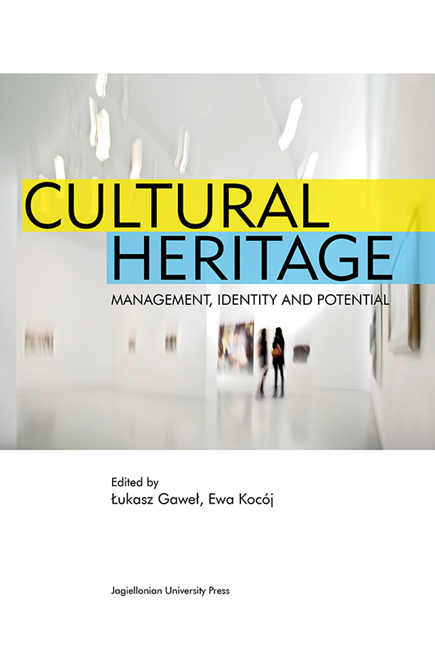Book contents
- Frontmatter
- Contents
- In Lieu of an Introduction
- Towards New Areas of Heritage and Cultural Heritage Management (Introduction)
- Pandora's Box or The Holy Grail? On Managing Cultural Heritage
- Cultural Heritage Within Postmodern Reality
- Legal Protection of Intangible Cultural Heritage. The Concept of the Safeguarding of Expressions of Folklore
- Cultural Heritage as a Shared Resource. The Role of Collaboration Between Stakeholders in Cultural Heritage Management
- Urban Exploring – City – Heritage – Identity
- The Thematisation of Public Space – a Problem or a Necessity?
- Memory for the Future. Managing History Within the Framework of Museums
- Historical Museums: Between Collective Memory and Politics of Historical Memory
- Between Ownness and Alienness: Towards the Dialectic of Cultural Heritage
Memory for the Future. Managing History Within the Framework of Museums
Published online by Cambridge University Press: 10 January 2018
- Frontmatter
- Contents
- In Lieu of an Introduction
- Towards New Areas of Heritage and Cultural Heritage Management (Introduction)
- Pandora's Box or The Holy Grail? On Managing Cultural Heritage
- Cultural Heritage Within Postmodern Reality
- Legal Protection of Intangible Cultural Heritage. The Concept of the Safeguarding of Expressions of Folklore
- Cultural Heritage as a Shared Resource. The Role of Collaboration Between Stakeholders in Cultural Heritage Management
- Urban Exploring – City – Heritage – Identity
- The Thematisation of Public Space – a Problem or a Necessity?
- Memory for the Future. Managing History Within the Framework of Museums
- Historical Museums: Between Collective Memory and Politics of Historical Memory
- Between Ownness and Alienness: Towards the Dialectic of Cultural Heritage
Summary
Abstract: The most important idea in this article is that managing a museum means as much as managing history. It is important to be aware that managing memory is indeed equal to managing the oblivion. Whatever will be overlooked within the collection (memory), will most probably be forgotten. Museums should remember that it is about making incessant choices as to which elements of heritage should be preserved and kept in appropriate conditions to be available for further generations. There is a lot of evidence of political, ethnic, social, economical and cultural exclusion. We need to emphasize that all the members of a given community foster its culture and history. Certainly, not all of them participate in its development equally – certain groups (e.g. political) or certain individuals (such as artists) become especially active in certain periods of time or are more influential than other groups in the development of a culture within a smaller community or the entire society. But museums should remember about all of them and should build their collections and displays having all the cultural objects and abjects (acc. to Yulia Kristeva). If a museum is to be the seat of memory and history it needs to include the memory and history of everyone.
Key words: memory & oblivion, abjects, museum, exclusion
Managing the museum means as much as managing history; it is a specific sort of management pursuing the needs of the future. The idea has been defined by ICOM (International Council of Museums), which by determining the essence and key tasks performed by these institutions, so valuable within the realm of culture, emphasizes that a museum “acquires, conserves, researches, communicates and exhibits the tangible and intangible heritage of humanity and its environment.” Developing a collection means to continuously answer questions about what is important to be remembered for future generations, what will (or could) have significance and what answers or meanings will be sought after by the ensuing museum frequenters. In other words, it is about making incessant choices as to which elements of heritage should be preserved and kept in appropriate conditions to be available for further generations.
- Type
- Chapter
- Information
- Cultural Heritage - Management, Identity and Potential , pp. 97 - 106Publisher: Jagiellonian University PressPrint publication year: 2015



